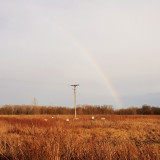Care To Dance? [Contest Round 1]
-
Britt
12 years agoFor each round I will post a new style of dancing and a few prompts that go with it. I'm a big fan of Dancing with the Stars tv show, and it sparked a fun idea. We've been doing this in FOP and it's been a lot of fun!
FIRST ROUND:
LATIN!
Latin dances include: Salsa, Tango and Paso Doble.
In this round you may write up to three poems -- one for each dance. It can be about the dance, a poetic dance, the history, something to do with the country it's a part of, a famous dancer, ANYTHING really that inspires you -- whatever appeals to you.
CHARACTERISTICS OF THE DANCES:
Salsa: Think sexy & sensual. Fluid hip movements, grinding, fast pace, circling each other.
Tango: Dramatic, sensual, intense. Strong movements and lines.
Paso Doble: Think of a bull and matador. Lots of strong lines, circling one another as if ready to fight, wide, spinning arms (like flicking a red flag for the bull).
------------------------------------------------
*For each poem you write, you must include a color variation of the word red -- red, rose, crimson, fiery.. the more creative, the better.
*If you write about SALSA - this poem must be done in a form. ANY form you choose, but cannot be free verse or prose.
*If you write about TANGO - this poem must be free verse or prose.
*If you write about PASO DOBLE you must incorporate a version of a bull (metaphor, simile, imagery.. you don't have actually USE the word bull itself).
-----------
PLEASE PM your poems to me. Deadline is Tuesday, May 28th at 16:00 PnQ time. Please include the form of dance with your PM. -
Larry Chamberlin
12 years agoChels,
I don't think Salsa grinding on Duck Dynasty is the same as Salsa dance grinding.
:8-} -
Poet on the Piano
12 years agoThis is AMAZING, I am so pumped for this Britt! Was very neat reading some poets from FOP past pieces on dances they had as prompts, so this will be fun! Thank you, definitely will be a challenge & a bit risque lol
-
Britt
12 years agoWoot! Glad youre excited!! Foppers had a lot of fun (so they say... theyve cursed me a bit I'm sure!)
-
-
Britt
12 years agoNope they don't.
-
Britt
12 years agoOne poem in so far :)
Don't forget, you can write up to three poems! -
Britt
12 years agoYeah.. if you want to write just one thats fine. Just saying theres an opportunity to do three for more points :)
-
Britt
12 years agoLol Myryn you had fun with it, hush! :P
2 poems in so far! -
Britt
12 years agoFive poems in so far.. one contestant got all three poems in!
Keep em coming, guys. All five poems so far are really great! -
Britt
12 years agoSix poems in.. various clubs but none yet from TC.
Come out, come out, wherever you are ;) -
Britt
12 years agoDeadline has passed... I'm extending it a little more because there are a few people who say they're almost done :) Few more hours!
-
Britt
12 years agoIll give three more hours!
-
Britt
12 years agoROUND 1 POEMS:
Absolution (Tango)
Underneath your rib cage is where thy own heart resides
entangled in a mass of pulsating emotion, tendrils snaring
and daring to hope they can entwine with yours.
Passion glitters rubescent, and heat shimmers through the air
as we pirouette wildly, limbs matched in perfect symphony
feet tapping in rhythm to the piano notes only we can hear
Static carnal energy weaves between us as
we twist and turn, bodies melding into each other
in absolution
``````````````````````````````````````
Title: The Flare of the Night
I saw stars in the azure skies of his hazel eyes
the moon in black and a silver glow like a smile
all combine in an iris
to illuminate a feeling sublime in my heart.
It was midnight in the summer time of my life
and he was there
dancing
to the beats of empty streets filled
with thunderous rain.
I heard his voice several times
reverberating in the background.
And just when I thought his foot stomped the floor,
I saw a thunder striking a bull.
And he rouse,
like a matador who killed my stubbornness
to finally say hello.
His dance was lighting,
and my heart was the bull.
```````````````````````````````````````
Title: Tango or Paso double?
tango between glances
of dancing or making love;
two love birds
circling on a ballroom.
With horizons of red and white
embellishing the atmosphere,
they kissed an ascending stance
into the skyline of each other
eyes and they. . .
danced
their love out.
```````````````````````````````````````
Abrazo.
She often danced like
a flamingo. Stiletto legs,
neck arched, and scarlet lips
piercing his soul.
Bold eyelashes fluttered
an invitation to tango; for he
was the one who taught her
how to love through music
echoing streets of Argentina.
His breath tingled her spine,
while eyes mimicked passion;
locked in stalemate, their hip
bones like dimples, softly
sweeping against one another,
before sliding into intimacy -
for 'el abrazo es mas
importante que el paso'
(The embrace is more
important than the step.)
--
Dance: Tango
````````````````````````````````````
Dance: Paso Doble
Form: Free-verse
Title: Unpacking
Last night I had to unpack
a thought of you -
a time capsule I vowed
to never call.
It was chalky
and cardboard fragments
stuck to the tape that once
connected our appendages.
The rot of dysfunction
choreographed its way
between mildewed prayers
and swollen shadows.
Somehow my success
toe-danced mockingly
around your failure -
a permanent scar singed
on my nape from your
flaring nostrils.
--
Last night I unpacked
and repacked a thought of you -
sealing it with a vale stamp
and shipped priority mail
to a blood-lusted incinerator.
*note: vale is latin for goodbye.
```````````````````````````````````````
Dance: Salsa
Form: Double Tetractys
Title: In Her Shoes
She
whispers
confidence
to the ruby
carnation resting behind her lone ear,
promising that when the music begins
that she will dance
for herself -
not for
him.
````````````````````````````````````
Dance: Tango
Form: Free-verse
Title: Tangoing Bridges
You sauteed raspberry-pomegranate sorbet
'tween honeymoon jargon and
tangoing tongues -
a candied campfire that
amplified with sighs and
swayed with each journey.
Once the sun melted
into our palms and
the sea of flames
waved over forty winks,
I built swinging bridges
over puddles and two-stepped
with Buenos Aires one more night.
````````````````````````````````````
A Matador Dance
They were lying breathless-lifeless
in their own actions,
while it was raining with
pestilent red roses.
And he kept swaying gently
around them; laughing
and humming his death notes,
sprinkling grayish petals
to close their innocent eyes,
covering them with a crimson cloth.
He watched every move he made,
for he was waiting for her...
...to complete his unfinished
harmony.
Dance: Paso Doble
````````````````````````````````````
Reverse Double Etheree
Unwanted Swaying
Diagnose me a "delusional", but
I swear, your osculating movements
around my nervous system are
intentional. Who taught you
to snatch fiery hearts at
that velocity?
I must never
forgive these
rhythmic
beats.
Stop!
My head
is spinning,
mind is dizzy,
and I never did
agree to dancing. You
must know, I can't keep up with
your circling and the temptation
of your God-forbidden closeness! Please,
shut off the noise, and leave my heart astray.
version of red: fiery
dance: salsa -
L
12 years agoTitle: In Her Shoes
^^ I like this one -
Tara Kay
12 years agoReally good pieces.
I like "Unpacking" though. -
Larry Chamberlin
12 years agoCreative and sensual entries.
-
Britt
12 years agoRESULTS RESULTS RESULTS!!
So everyone knows, because you are allowed to write (up to) 3 poems a round, this is NOT an elimination contest. Your points will be accumulated throughout each round, so if you only wrote one this time, you may write three in Round 2! If you didn't write a poem for this round at all, enter round 2 and see how you do :)
*Two of our judges missed one poem, so I will be adding that as they come in!
``````````````````````````````````````````
1. Unpacking - 25/30
2. Unwanted Sway - 25/30
3. A Matador Dance - 23/30
4. Tangoing Bridges - 23/30
5. Abrazo - 22/30
6. Absolution - 22/30
7. In Her Shoes - 22/30
8. The Flare of the Night - 21/30
9. Tango or Paso Double - 15/30
```````````````````````````````````
Unpacking
I found this one of the most intriguing pieces in the round and it got me thinking. The word use overall was polished and not subtle, allowing the reader to wonder and get into the mind of the poet and relationship. The bull and matador reference is there in the fourth stanza and I think it's used discretely which is a good thing. The last two lines let it down a little: the description of a 'blood-lusted incinerator' doesn't sound quite right: but overall it was an interesting piece and well done. (8)
***
This is probably one of my favourite poems from this round. While noting some interesting words and lines from this piece which are: "time capsule, appendages, the rot of dysfunction, choreographed, and mildewed prayers", I find the use and placement of all of these, accurate and wise.
The title seems very weak at first glance, but while reading through, I feel like there is no better title that would suffice better than what it is now. It's not only fitting but also gives the reader a concise summary of its content.
I love the sarcastic-somewhat-humorous tone of this piece. However I find the ending a bit tactless and inapt to the whole expression of this poem. "to a blood-lusted incinerator", to say the least, is a bit too much. Overall, I really enjoyed reading this poem. (9)
***
Great imagery although the circling effect is thrown in intermittently without being developed as an integral part of the work. There are some intriguing phrases that could be teased into fulsome flesh: (between mildewed prayers
and swollen shadows; my success toe-danced mockingly around your failure).
Rules: 4
Quality: 4
Total 8/10
````````````````````````````````````
Unwanted Swaying
This is a good example of an etheree: it isn't obvious when reading the poem that the poet was tied to a syllable count, it just flowed nicely. Also I like the use of the word 'dizzy' which helps us feel as well as see the dance. I like the speaker's addressing the 'you' in the poem: It makes the poem quite personal and gets the reader interested in their relationship. I like the frantic and almost paniced tone. The word 'astray' doesn't sound perfect at the finish unfortunately although maybe that's just me. All in all, a great effort and passed the challenge with flying colors! (8)
***
I love the creative spontaneity being displayed here. It takes and holds my interest throughout the poem. It's amazing how the title seems to connect with the structure of the poem. Its syllable count gives an impression of repetitive movement or flow, hence, unwanted swaying.
The author uses simple language and naturally, the ideas and images are clearer. The insertion of carefully chosen vocabulary such as: velocity and osculating is effective as it accentuates the theme of this piece.
I would give this a 10, only if not for the untimely line break that affects the line's rhythm and meaning. (9)
***
Good attempt at a clever manner of portraying the fast and throbbing nature of the dance. However, many line are arbitrarily broken to match the syllable count rather than providing natural transitions (lines 3-4, 5-6, 16-17, 17-18, 19-20) . Others are well done (lines 2-3, 4-5, 7-8, 11-12, 14-15).
Rules: 5
Quality: 3
Total 8/10
```````````````````````````````````````
A Matador Dance
On first reading I didn't get this poem. Then I remembered to apply the context of the title and challenge (matador and bull) and it became an eye-opening experience. I think the description paints a very clear picture and this imagery is probably the best in the round. It is clear but not over-complicated, but not too simple or plain either. 'In their own actions' - I thought this was a great line. Punctuation was also used well to build tension and a sense of inevitability at the end. The poem can also be seen as a metaphor for a smooth talking playboy charming and breaking the hearts of women. The only fault is perhaps the fact that he is overly evil and therefore a little basic: (Laughing at their deaths) It would have been better to portray him as stoic. (as he probably would be if there was still a bull left in the arena, he wouldn't be laughing as such) Portraying him as totally evil in this manner leaves the reader feeling the poet took sides a little too much as the impact may have been greater if it was left to the reader to do so. However all in all it was an interesting piece and well done. (8)
***
I love the use of descriptive words here, such as: "pestilent red roses, grayish petals and crimson cloth". I could visualize red roses and gray petals being thrown in the direction of the matador. Reading this poem is like witnessing an actual bullfight while the matador performs some of his holy gestures in preparation for the bull's death.
I find the ending a bit weak, not to mention, a bit confusing, until I reread it again and realized that "her" is actually referred to as the bull. (8)
***
The poem is too fragmentary to imply the full story. There are hints and teases, but it seems much of the message was left in the poet's head rather than finding its way to the finished product.
Rules: 5
Quality: 2
Total 7/10
````````````````````````````````````````
Tangoing Bridges
I like the use of place-names in this piece: it gives the poem a locality and sense that this actually is happening/has happened to the poet. On the flip side, the poem sounds a little like a thesauraus at times and the word choice seems a little forced in that the poet is trying to be 'poetic' and flowery. Also, 'tween doesn't really work, why not just say between? The alliteration is well used. Overall, I think the tone is conveyed quite well but the real impact and/or message is lost somewhat amongst the over-complicated wording and 'scripted' nature of the poem. (5)
***
Just by reading the title, this poem has immediately become a favourite of mine. And as I read through, I'm glad I wasn't disappointed. The language being used here is heavy in detail such as "raspberry-pomegranate sorbet, honeymoon jargon [love the word], tangoing tongues" and "candied campfire". The use of alliteration here adds magic to the whole poem.
This poem is absolutely enthralling. Love the phrasing, the unfaltering sequence of every line, the powerful emotional punch (especially the ending), the unforgettable imagery, the characters, the impressive diction, really, I feel like a child in a candy store, so many striking images worth mentioning here. (10)
***
Good use of alliteration, mixed results in the images evoked. "Amplified" is used in the passive sense as to the campfire but placed in active syntax in that it does not relate back to it's subject. Try choosing passive "campfire that was amplified" or active "that amplified our sighs." The stanzas are independent of each other, although each is dynamic. A tie in would help build a cohesive dance.
Rules: 5
Quality: 3
Total 8/10
`````````````````````````````````````````
Abrazo
The poet here made a good effort to capture the tone and feel of the tango dance and was quite successful for the most part. What lets it down a little is the 'piercing his soul' description (Flamingos give graceful, soft image and the 'piercing the soul' is too stark a contrast, it's not something the reader thinks of them doing). Some punctuation is needed in stanza two to help the flow. Also, I wouldn't use the word 'mimicked' as it conveys copying or falseness, and passion is something that should be associated with being real and honest, not 'mimicked.' (which belittles it somewhat). Overall a good effort but little flaws let it down and it fails to truly capture the readers full attention. (5)
***
I like that the opening line serves as a teaser snippet of what to expect from this poem. "She often danced like a flamingo", flamingos are tall, graceful and beautifully coloured, and hence, I find the succeeding lines smartly written, [stiletto legs, long neck, and scarlet lips] for they perfectly fit to the ascending sequence in the poem.
The third stanza is probably my favourite part from this piece. The comparison between dimples and hip bones is quite interesting and spot on, too. I could effortlessly visualize those untamed hips delicately swaying while giving that seductive smile at the captivated audience.
However, I find the ending, inconclusive or deflated by the imagery that precedes it due to its lack of creativity or originality. (8)
***
This is subtly passionate and develops warmly at an increasing tempo - a slow tango drawing out the nuances of the moves.
Rules: 5
Quality: 4
Total 9/10
```````````````````````````````````````
In Her Shoes
I think the poet did well with the form in this piece to use it to the fullest advantage: It isn't an easy one but quite a lot of content is packed into it. It may lack a little in portraying the tone of the dance, but this is in part due to the form's brevity. There is a simple message in the poem which is easy to relate to for many readers. Perhaps there is a slight conflict between the confidence she shows and the fact that she is telling herself not to dance for him: Perhaps some vulnerability may have added to the poems depth and told us more about her character. All in all though a good effort. (6)
***
This is probably one of the hardest poetry forms to write in due to its restricted syllable count, twenty syllables to be pr���©cised. This poem adheres to the rules of double tetractys by having the exact syllable counts and conveying a profound thought.
The only criticism I would give is avoid the untimely line break as it is distracting and stuttering given it is a written in a form, hence, each line should only retain its own structural independence. (7)
***
Ironic poem of a temptress who doubts her own resolve not to succumb. "Lone ear" connotes a misshapen appearance that I don't think was intended. Perhaps "left ear" or "lone carnation" might work better. Be careful of redundancy: "that when the music begins that she."
Rules: 5
Quality: 4
Total 9/10
`````````````````````````````````````````
The Flare of the Night
This poem had some nice imagery and word use, especially at the start which drew me in and the rhyme wasn't too obvious. I don't think the 'bull' metaphor/reference worked very well, perhaps using the word itself (which is quite non-poetic generally) twice was a mistake. I think it could have been done better somehow or I just didn't see it as effective and it let the ending down a little. Also there are some typo/spelling errors e.g. rouse should be rose and I think Lighting should be lightening. Which is a pity because the poem seemed to start with great potential and had good energy. (5)
***
I love the author's use of colorful vocabulary and striking metaphors in this piece. Given that it is based on diverse and vivid imagery, I could picture a multicolored iris that's piercing and dominating, almost scary, hence, the use of "sublime" here fits perfectly. Also, I could almost hear the deafening, "thunderous" rain and visualize a thunderstriked but invincible bull and it is worth noticing that the author uses images about the beauty and wonder of nature, well, except for the bull and matador part, which definitely fits the prompt smoothly.
And he rouse,
^ I think this should be "roused" [I could be wrong though]
Other than that, I think that this poem adheres to the prompts and evokes lots of imagery that are really appealing to the reader's sense of intellect and emotions. (8)
***
Colorful imagery, rich with celestial symbolism used somewhat in point-counterpoint (stars in blue skies). It is both sensual and creative (dancing to the beats of empty streets filled with thunderous rain). No incorporation of a variant of red. Some metaphors are anti-intuitive (saw a thunder striking).
Rules: 4
Quality: 4
Total 8/10
````````````````````````````````````````
Tango or Paso Double?
I got the feeling this was a rushed piece and while it had some appeal, I didn't get much from reading it. Also, I think trying to mix the two dances together wasn't the best idea: I don't see any reference to a bull (literally or metaphorically) and when you had the freedom of free verse, it seemed a little short and under-developed. Also there's a typo near the end which throws off the reader (each other should be each others). (3)
***
Paso double? Was it meant to be "doble"? Also, I don't quite understand why the first line isn't capitalized. At first, I thought it's the author's style until I read through the second stanza.
This piece shows a lot of potential depth if perhaps longer. It's true that it's not the length of the poem that matters, but since the lines are also short, the use of repetition is really not worthy, for example, horizon, atmosphere, skyline are basically conveying the same image.
Also, I feel like the ending is lacking of more powerful emotional punch. (6)
***
Too cute for a tango yet too blase for a Paso doble. Spelling errors interfere with the enjoyment (double for doble, other for other's) while some images don't have the desired effect (skyline of each other['s] eyes).
Rules: 4
Quality: 2
Total 6/10
````````````````````````````````````````
I like that that words being used here are very similar to each other as it creates a subtle rhythm in the poem. So many times these kinds of poems can seem trite but this is an exception to that. It has a wonderfully smooth flow. I always read poems out loud and this one seems easier to memorize. I had fun reading this poem; however, I find the author's lack of utilization of periods, commas, etc. to be completely distracting to the overall appearance of the poem. (7)
***
Absolution
Follows the theme of the Tango well: strong, sensual and dramatic. The title and finale are not supported by the rest of the poem. Absolution (forgiveness) is not the normal climax of passion.
Rules: 5
Quality: 4
Total 9/10







